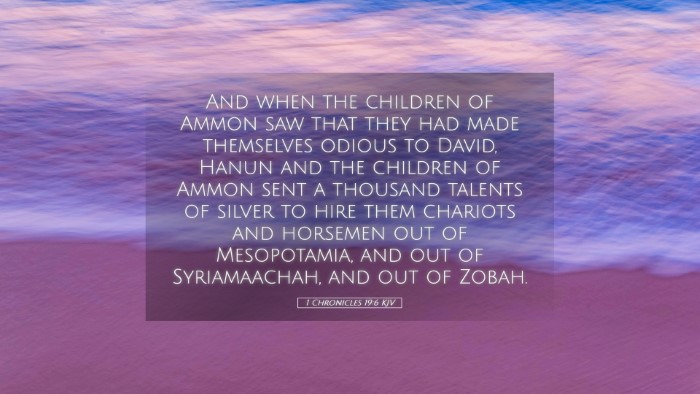Commentary on 1 Chronicles 19:6
Bible Verse: "And when the children of Ammon saw that they had made themselves odious to David, Hanun and the children of Ammon sent a thousand talents of silver to hire them chariots and horsemen out of Mesopotamia, and out of the Syrians of Maachah, and out of Zobah." (1 Chronicles 19:6)
Overview
This passage unfolds during a time of political intrigue and military maneuvering, illustrating the complexities of relationships between nations and the consequences of perceived insults. With an emphasis on both spiritual and social dynamics, the verse calls attention to the human tendency to respond with pride and hostility, as well as the larger implications of such actions.
Contextual Background
The historical setting of this chapter aligns with David’s reign over Israel, marked by significant territorial expansion and military engagements. The Ammonites, initially hostile due to David’s previous actions, find themselves at a crossroads of vengeance and diplomacy.
- Historical Conflict: The animosity between Israel and Ammon is rooted in longstanding enmity.
- Political Dynamics: David's initial kindness to Hanun, the new king of Ammon, was met with suspicion and insult when the king rejected his gesture of goodwill.
- Military Alliances: The recruitment of allies signifies the importance of military strength and strategic partnerships in ancient conflicts.
Commentary Insights
Matthew Henry's Commentary
Henry observes the foolishness of Hanun’s actions, highlighting how the king’s advisors turned a potential friendship into animosity. He reflects on the nature of human pride, emphasizing how it leads to folly. David’s kindness transformed into hostility demonstrates the tragic outcomes of misunderstanding and insult.
Albert Barnes' Commentary
Barnes highlights the significance of the Ammonites’ decision to hire mercenaries. He notes that the children of Ammon responded to David's apparent slight with an overwhelming show of force, showcasing their fear and desire to defend their honor. Barnes draws parallels to contemporary political maneuvers where slighted principles often lead to aggressive retaliations.
Adam Clarke's Commentary
Clarke delves into the specifics of the chariots and horsemen hired from Mesopotamia, Maachah, and Zobah. He elaborates on the geographical significance of these areas, suggesting that the Ammonites sought capable fighters to compensate for their weakness. Clarke points out that reliance on foreign powers can lead to misplaced trust, potentially inviting further conflict rather than resolution.
Theological Implications
This verse provides a deeper understanding of the relationships between nations, emphasizing the implications of pride and the consequences of conflict in a theological context.
- Human Nature: The reaction of Hanun illustrates the challenges of human relationships and the susceptibility to pride.
- Divine Sovereignty: The unfolding events highlight God’s overarching plan in guiding nations and rulers, often through seemingly mundane interactions.
- Conflict Resolution: The need for humility and diplomacy over aggression is a timeless lesson for leaders today.
Practical Application
The insights from this passage can be applied to both personal and professional contexts. Leaders and individuals alike are reminded of the importance of humility, understanding, and the avoidance of actions that might provoke unnecessary conflict.
- Encouragement of Communication: Just as miscommunication led to conflict in this scenario, open dialogue can prevent misunderstandings in our communities.
- Promoting Peaceful Resolutions: Seeking peaceful solutions, rather than retaliatory actions, can foster healthier relationships and communities.
- Relying on Wisdom: The importance of wise counsel is vital—leaders should choose advisors carefully to avoid decisions borne out of pride and fear.
Conclusion
1 Chronicles 19:6 serves as a profound reminder of the complex interplay between human relationships, pride, and conflict. The historical narrative enriched by the insights of respected commentators calls us to reflect on our own lives—inviting us to choose humility over pride, diplomacy over conflict, and understanding over hostility. Whether one is a pastor, student, or theologian, the lessons gleaned from this passage resonate deeply in the discourse of faith, leadership, and interpersonal relationships.


